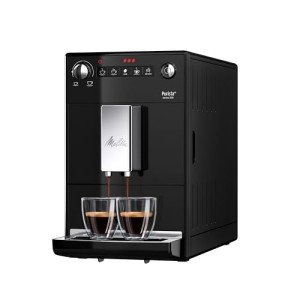Home Use Espresso Machines: A Comprehensive Guide
Espresso machines have become a staple in numerous homes as coffee lovers seek to reproduce café-quality brews in the comfort of their kitchen areas. The increase in appeal has actually caused a varied market filled with various designs, functions, and prices. This article aims to offer a helpful summary of home use espresso machines, helping readers navigate their alternatives effectively.
Comprehending Espresso Machines
Espresso machines work by forcing warm water through finely-ground coffee under high pressure, resulting in a concentrated coffee beverage known as espresso. There are several kinds of espresso machines classified based upon their brewing approaches and level of automation. The most common types include:
- Manual Espresso Machines: These need the user to control the pressure and water flow, permitting a more hands-on coffee-making experience.
- Semi-Automatic Espresso Machines: These use automatic control over water pressure, while the user by hand grinds and tamps the coffee.
- Automatic Espresso Machines: With the push of a button, these machines automatically control the circulation of water, making it easier to brew espresso with constant results.
- Super-Automatic Espresso Machines: These all-in-one machines deal with grinding, tampering, developing, and even milk frothing, making them perfect for users searching for benefit.
- Capsule or Pod Machines: These use pre-packaged coffee pods to develop espresso with very little effort, however they restrict option in developing techniques and tastes.
Table: Comparison of Espresso Machine Types
| Type | Control Level | Alleviate of Use | Cleaning Level | Perfect For |
|---|---|---|---|---|
| Manual | User-controlled | Moderate | High | Coffee perfectionists |
| Semi-Automatic | Partial automation | Moderate | Moderate | Home baristas |
| Automatic | Fully automated | Easy | Low | Hectic individuals |
| Super-Automatic | Completely automated | Extremely easy | Very low | Convenience seekers |
| Capsule/Pod | Totally automated | Very simple | Very low | Casual drinkers |
Secret Features to Consider
When choosing a home use espresso machine, it's important to consider various functions that can considerably impact the quality of espresso and user experience.
- Pressure: Look for machines that supply a minimum of 9 bars of pressure, as this is thought about optimal for developing espresso.
- Boiler Systems: Single vs. dual boiler systems figure out temperature stability and the capability to brew espresso and steam milk all at once.
- Grinder: Integrated grinders allow for newly ground coffee, which improves flavor. Think about machines with adjustable grind settings.
- Milk Frother: For those who enjoy cappuccinos and lattes, a built-in steam wand or automatic frother is vital.
- Size and Design: Consider your kitchen area and visual preferences. Machines are available in various sizes, from compact to big setups.
- Cost: Home espresso machines can range from a couple of hundred to numerous thousand dollars, so it's vital to develop a budget before checking out options.
Advantages and disadvantages of Home Use Espresso Machines
| Pros | Cons |
|---|---|
| Benefit of brewing coffee in your home | Initial financial investment can be high |
| Quality of espresso is typically exceptional | Requires some skill, especially with manual machines |
| Ability to explore tastes | Upkeep and cleansing can be labor-intensive |
| Can save cash in the long run | Not all machines will fit every coffee preference |
Upkeep and Cleaning Tips
Preserving an espresso machine is important for prolonging its life and ensuring consistent brew quality. Here are some helpful suggestions:
- Regular Descaling: Minerals from water can develop up in the machine. Modern Espresso Machines -3 months, depending upon water firmness.
- Daily Cleaning: Rinse portafilters, baskets, and steam wands after each use to prevent coffee oils from constructing residue.
- Use Filtered Water: This can help decrease mineral buildup and improve the taste of coffee.
- Replace Gaskets and Seals: These parts may break in time and must be replaced to maintain pressure and efficiency.
- Read the Manual: Each machine has particular care instructions; following these will ensure durability.
FAQs About Home Use Espresso Machines
Q1: What is the very best budget espresso machine?The best budget espresso machine often depends upon specific needs, but designs like the DeLonghi EC155 or the Breville Bambino are popular amongst users for offering fantastic value. Q2: How long do home espresso machines normally last?With proper maintenance, home espresso machines can last anywhere from 5 to 15 years, depending upon the quality of the machine and frequency of use. Q3: Can I make coffees and lattes with any espresso machine?While most espresso machines can make cappuccinos and lattes, having a trustworthy
steam wand or frother is necessary for achieving the best milk texture.
Q4: Are super-automatic machines worth the investment?For those who prioritize benefit and quick developing, super-automatic machines can be worth the investment, though they might do not have some customizability in brew strength and flavor. Matte Espresso Machines : What types of coffee beans are best for espresso?While personal choice contributes, beans identified as" espresso "blends are generally roasted darker, producing rich tastes and a creamy texture when brewed.
Buying a home espresso machine can transform the day-to-day coffee routine into something special, raising home brews to café quality. By understanding the different kinds of machines, essential features to think about, maintenance requirements, and weighing the
advantages and disadvantages, customers can make informed decisions that suit their private choices. As the espresso culture continues to grow, no matter the choice, every brew can be a scrumptious experience waiting to be relished.

